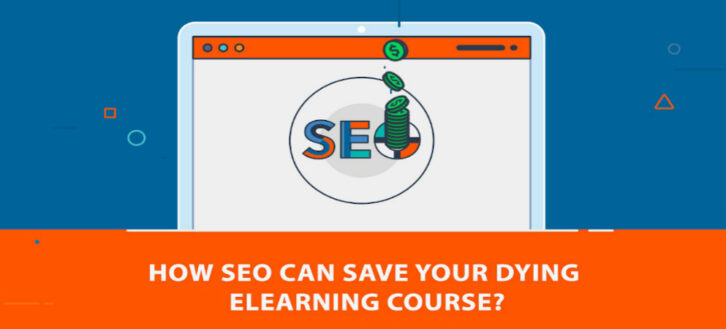You might have created one of the best eLearning courses on the web. Rich with unique information. With a distinctive style. Easy to use and everything good that an eLearning course can have. But does it all guarantee you sales?
Certainly not!
So, your best bet?
Turn to SEO.

While most of the marketing methods cost the earth and still can’t always guarantee you results, SEO is something that’s completely organic and won’t make you have to break the bank. No wonder, it can be a lifesaver for your dying eLearning course.
How to use SEO to Revive Your Dying eLearning Course?
SEO and its implementation are subject to the niche and product. Not that you can’t use the same effective SEO strategies for various industries, but their implementation will need to be slightly restructured.
Similarly, this holds true for businesses in the eLearning industry as well.
Keeping the same in mind here’s a bunch of tips that you can use for expanding your eLearning course’s reach, resulting in a boost in sales using SEO.
1. Unlearn the myths
The first most important thing to do before moving ahead with your SEO strategy is to burst the general myths that you might have about SEO.
Myth 1 – HTTPS isn’t necessary: Understand that the guy who told you that HTTP and HTTPS are the same in the eyes of search engines lied or didn’t know enough.
In September 2016, Google made clear the fact that website security largely affects on page SEO.
So, take action and immediately install a qualified SSL certificate on your website, if you already haven’t.
Myth 2 – Meta tags boost search rankings: Another one of the major SEO myths that you need to give up on is that meta tags improve search rankings.
It’s crucial to have adequate meta tags for any web page on your eLearning course’s site. However, they aren’t distinctly taken into consideration for upgrading or downgrading your website rankings.
Myth 3 – Sitemaps boost rankings: The fact that submitting sitemaps doesn’t really boost search rankings can surprise many. But, turns out, it’s totally true.
Casey Henry in one of his tests found out that it can take the crawlers around 14 minutes to revisit a newly published webpage after generating a sitemap. While it took 1,375 minutes without sitemap to get indexed.
Still submitting sitemaps is crucial as it brings to the table a number of statistics that can turn to be really useful for helping you scale your eLearning course website’s SEO.
Myth 4 – Optimizing for exact search terms can harm: While Google’s Hummingbird update has scared one but many marketers, turns out there’s no need to be scared.
Focusing unnecessarily on the exact keywords can get you in trouble. But, if those keywords are being used relevantly, Google’ll always be smart enough to get the context.
2. Right Keywords are worth the Gold

One of the most important parts of any SEO or PPC for authoring tools campaign is the right set of keywords.
While creating content for the right keywords can earn you a fortune overnight, the wrong ones may not take you anywhere even after days and days of continuous hard work.
So, how to make sure you are using the right keywords?
The following tips will help you find the sweetest bunch of keywords to step-up your eLearning course website.
- Know the right tools: While keyword research a decade ago would make you have to break the sweat, the days have changed now.
This is the time when you can find the best keywords with the help of several keyword research tools like Google Keyword Planner. - Look at the search intent: The next filter you need to pass your target keywords through is search intent.
What it means is, you need to know the searcher’s intention behind making a particular search query and pick your keywords based on that only.
For example, a person looking for basic knowledge about the topic of your eLearning course may not immediately pay for it.
This makes it important for you to focus on keyword intent and pick keywords accordingly. - Long-tail keywords are important: While individual search volume of keywords is an important metric, it’s not all that matters.
Long-tail keywords may not hold much search weight, the right ones can help you drive-in a mini-flood of qualified visitors.
3. Content is King and will always be

The most fruitful keywords in the world can fail to pay you well if your content isn’t good.
As the world on the web is highly competitive, the need for being totally spot on with your content is real. That’s what is backed and boosted by all search engines. So, make sure you do so. The following tips will help you craft brilliant content pieces; every time.
- Keep it clear: Avoid difficult sentences. Try to be as clear as you can be with your words. Giving your readers a chance to be confused shouldn’t even be the last thing you do.
So, keep it straight. Keep it clear and deliver your message in a comprehensible language. - Be concise: The next thing you need to know is that your content needs to be concise. Basically, no one likes to read 4,000 words for 1,000 words worth of information.
Solution: Shorten sentences. Remove redundant information. Be as relevant as you can be. Evacuate filler words. - Try to compel: Your aims behind creating content are to:
1. Rank better
2. Convert better
How do you think that can be made possible if your content fails to compel your readers?
It’s as simple as it gets. Compelling content wins when conversions are concerned.
So, what you need to do is read your pieces again and again and see how its compelability can be maxed out.
4. Link Building Tip 101: Quality > Quantity

There used to be times when the number of backlinks your site had would decide its search rankings. Thankfully, for all the goodness, those days are gone now.
This is the time when quality matters over anything.
So, you know, all those blackhat link-building techniques, GSA blasts, references links on blogs and websites coming from the deep-dark corners of the web, All of them would do more harm than benefit for your website’s SEO.
What can save you here is quality backlinks. And how to get them?
One of the best ways of getting high-quality backlinks is guest posting. Although there is a number of other techniques that are helping marketers build a fortune, guest posting is one of the least asking and most rewarding of those all.
To enhance your guest blogging strategy, consider the following tips.
- Pick only niche-relevant sites: Since Google has launched a number of updates concerning SEO factors, the line between right and wrong has become clearer than ever.
Relevance of content whether on-page or for the link profile is really crucial.
This means that the blogs you choose for guest posting need to be in or around your eLearning course or its topic’s niche.
So, keep this in mind and don’t pick blogs that aren’t related to your business. - Form relationships beyond backlinks: The main aim of guest-blogging maybe to build quality backlinks, it shouldn’t be all that you seek out of guest-posting.
When you reach out to a blogger in the eLearning arena, you should know that the blogger can also be your prospect or can at least drive more prospects towards your business.
Also, building long-term partnerships/relationships with bloggers will help you get more features in the future as well. And the backlinks, they come without saying. - Don’t create bogus guest-blogging content: One of the most common mistakes that marketers generally make is submitting bogus content on guest-blogging websites. This is unethical and won’t get you anywhere either because
1. The blog that you are going to get this post published on would have a reader base. Those readers would seek quality out of that blog’s content.
2. Submitting bogus content would result in time being wasted. You or your writers may spend some amount of time creating that piece of content and at the end of the day, it won’t even be read.
Instead, it’ll pull down your brand and that blog’s reputation.
So, avoid it.
Final words
SEO is a great tool for marketing all sorts of businesses online. However, in this post, we discussed some of the most useful SEO tips that can help you save your dying eLearning course.
Hopefully, this was useful.


